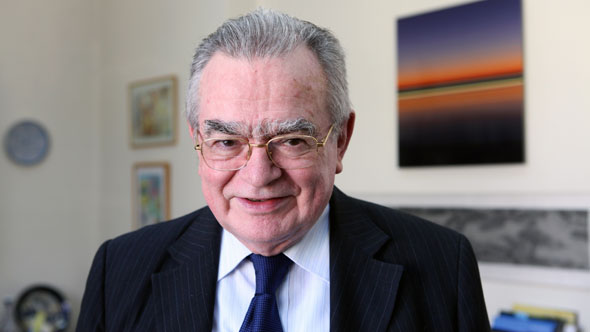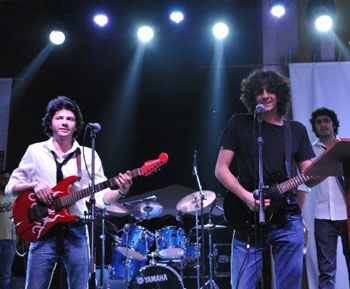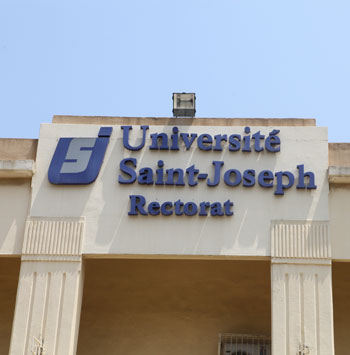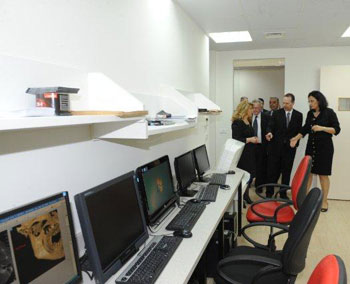French Education System in Lebanon: Universite Saint-Joseph
René Chamussy believes that having French universities like Université Saint-Joseph is a necessity. in 2003 Université Saint-Joseph became par of the European Credit Transfer System which was very welcomed by its students.
Interview with René Chamussy, Rector of Université Saint-Joseph (USJ)

The world is becoming more and more “English” with time, as English is the language of business. What are the advantages of both French and English school systems? What does the French system have to offer that the English system does not?
Two things come to my mind. On the one hand, from a general point of view, the world is indeed becoming more and more English; I was coming back from a conference in Chicago where one of the first interventions was about the problem of language. The lecturer was telling us that English has become the most essential and predominant language of all although we have reached a turning point, so to speak.
A new trend appears where university researchers are asked not only to do their work in English, because everyone speaks that language, but also to use regional dialects. We are going back to regional dialect and I must say that for me, the French-speaking world is a symbol of that, because it drives multilingualism. Also, universities require that students be trilingual and that they know English, French and Arab. They can graduate only if, at the end of their studies, they know English.  Hence, in that sense, there is room for coexistence of multiple languages, which I think is the future of research. To me, this is very important. The necessity of having French universities globally remains.
Hence, in that sense, there is room for coexistence of multiple languages, which I think is the future of research. To me, this is very important. The necessity of having French universities globally remains.
Since 2003, Université Saint-Joseph has chosen to follow the European program. This means that we are part of the European Credit Transfer System (ECTS) in which students are given credits according to their results and need a certain number of them to obtain their diploma. Those credits are transferable between all the universities that are part of the ECTS, around 45 institutions worldwide, which is not exactly the same as the American credit system. We have been following the ECTS model for some time now and we decided this year to ask the Council of Europe for an audit on that matter.
One important thing to mention is that students in Lebanon have many possibilities to choose from. Why should they choose Université Saint-Joseph? What great benefit do they have in going to USJ?
The Lebanese government chose to give more than 40 universities the possibility to deliver higher education diplomas. I’m not here to judge this decision. Still, one must not forget that Université Saint-Joseph is the second university in Lebanon. It was created in 1875, right after the American University of Beirut, in a certain atmosphere of rivalry. The competition which existed at the beginning no longer exists: I visited AUB a few years ago for the first time and we held a ceremony for the occasion. Never before had the rectors of Lebanon’s two oldest universities met. This being said, Université Saint-Joseph is a French speaking institution renowned for the quality role it plays in higher education at the national level; that’s one main reason why students chose to enroll in our University.
How do you see the Lebanese education system? What are the challenges and problems?
The government should be asked this question. However, we all know that there are many problems in Lebanon, especially at the governmental level. The consequences are sometimes catastrophic. The government gave permits to universities according to criteria that I am not in any position to judge, but that are sometimes surprising. As I said, there is currently some 47 authorized higher education institutions and five more pending authorization.
Since 2003, Université Saint-Joseph has chosen to follow the European program. This means that we are part of the European Credit Transfer System (ECTS) in which students are given credits according to their results and need a certain number of them to obtain their diploma.
A law aiming at regulating the higher education sector is currently being prepared by a parliamentary committee. The Vice-rector for academic affairs, who follows all issues related to the Ministry of Higher Education, is often consulted and has an active role in the discussions pertaining to that matter. I am certain that this law will be a good thing; it has been under preparation for a long time now and we hope that we will finally get positive results.
In higher education, there is a tendency for people to be less and less prepared for the job market. What do you think of this?
It is in this perspective that I’ve asked each of the institutions of the University to create committees that would create contacts with professionals within their field. For instance, Faculty of Engineering could ask for professional engineers to counsel them on training problems. In the management sector, we collaborate very closely with consulting companies to share their experience into reforms that we should integrate to our programs. I was recently talking to a general manager of a company who told me that he was pretty much satisfied with our graduates, because they had the exact needed profile and education for their assigned position. We consider that giving each and every student of our University a personalized service is a key element that corresponds to the philosophy of the Charter of the University and that of the Jesuit pedagogy. They need to learn how to think by themselves and be educated so that they can easily be integrated into the professional world.
Despite the fact that you are leaving in two months, I would like to know what your strategy and vision for Université Saint-Joseph.
My strategy turns around three axes.  The first one is to follow the footsteps of my predecessors and try to satisfy their objectives which relate mainly to the quality of education. The second relates to research. The third, which I consider to be fundamental, is about how to serve the society on volunteering basis.
The first one is to follow the footsteps of my predecessors and try to satisfy their objectives which relate mainly to the quality of education. The second relates to research. The third, which I consider to be fundamental, is about how to serve the society on volunteering basis.
Research is an important dimension in the mission of universities. We believe that teachers in all our institutions should start raising awareness of the importance of research. We also believe that building relations with major companies could lead to the creation of unidisciplinary or multidisciplinary chairs on subjects of interest to those companies or to the country; we recently put together a chair in road safety management supported by Renault-Nissan that aims at forming professionals in this particular field of interest for many regional countries. The newly built Campus of Innovation and Sports hosts this chair and many other research facilities.
Université Saint-Joseph has a trademark activity called The Seventh Day Operation. It was triggered by the war on Lebanon in 2006: during this dramatic period, many students, teachers and staff volunteered to help the refugees who fled from their towns and villages. Volunteers continued their activities even after war ended and it still goes on till now: each year, we try to take necessary actions in order to raise awareness among students of poverty or other issues critical to the country. After the war was over and the refugees back to their homes, we worked on a multidisciplinary project aiming to ameliorate the conditions of detention of prisoners in local jailhouses; this project was unfortunately terminated due to security turmoil within the prisons. We are working today on a program to help women in certain regions of Lebanon on issues related to juridical or professional matters. We are trying to encourage our students to volunteer for these projects, which they may choose to do or not; what matters for us is to raise awareness of the students for that third dimension of the universities mission. In education, there is knowledge to be gained and research to be done, but there is also the need to open up on the Lebanese society.
We haven’t touched the subject of major challenges yet. Many institutions of education in Lebanon experience difficulties in financing their projects, for instance. How about Université Saint-Joseph?
One challenge is to keep a high quality of teaching and we are constantly working hard on that matter; for that, we need to ensure that our teachers feel good about the way their career path is handled.  Another challenge is the need to meet the expectations: you spoke about money and for private universities it is an extraordinary challenge.
Another challenge is the need to meet the expectations: you spoke about money and for private universities it is an extraordinary challenge.
We believe that we manage to take up this challenge in two ways. First, we need to enroll as many students as possible; the more students we have, the better we can function financially. When I took over my first mandate, student enrollment was about 8 000. Today the number of our students is about 12 400. Second, we need to look for fundraising alternatives targeted, as I mentioned earlier, on research chairs; we are in the process of identifying big companies that would be interested in partnerships for that matter. We recently signed our first partnership with Renault-Nissan for the creation of the multidisciplinary chair in road safety management and we are also negotiating with other major renowned companies that will undoubtedly help us in our development path.
Are those companies mostly French companies?
The partnership with Renault-Nissan was triggered by the Renault Foundation which is linked to Nissan. But others may come from different countries. As I previously mentioned, we are currently in contact with many international companies.
How did you manage an increase from 8000 to 12 400 students?
I believe it was the adoption of the European Credit Transfer System that triggered this increase in the enrollment. My predecessor initiated the process and we finalized it. The credit system was warmly welcomed by the students. Besides, we performed an internal evaluation, followed by an external one performed by a French Evaluation Agency for Research and Higher education (AERES) which led to the University getting an accreditation; now, we are progressively getting accreditation for each of our faculties and institutes. This also helps in encouraging candidates to enroll in our University.
Do you have something else you wish to talk about, something we forgot to bring up?
The problem of Lebanese students leaving the country and the reasons behind this phenomenon are often mentioned. I think it is somehow a false problem. We live in an era of globalization; that makes it legitimate and normal to have students constantly on the move.  Truthfully, if I were a father, I wouldn’t regret having my children leaving to study or work abroad for some time on the condition of having them coming back and settling in their own country after a while: of course, it’s easier to say than to do.
Truthfully, if I were a father, I wouldn’t regret having my children leaving to study or work abroad for some time on the condition of having them coming back and settling in their own country after a while: of course, it’s easier to say than to do.
A survey revealed that 25% of our students leave to study abroad, and that 1 out of 4 of that percentage actually returns. In my opinion, this is considerable but normal, not to mention that some of them will come back later with competences and abilities that will only be beneficial for Lebanon.
This being said, we do not spare any efforts to help our graduating students find jobs in Lebanon to the extent of the possibilities offered by the economic, social and political environment in the country. As I previously mentioned, we work closely on that matter with companies and professionals from many different fields.
Lebanon is known for having excellence centers of education, but at the same time, doesn’t it face competition? What are the trends these days? In what way do you think education in Lebanon will continue to develop in the future? Do you think Lebanon will keep its status of a centre of high quality education?
I think it is more about networking; what matters is the network you belong to. This is why we chose to enter the European network to keep in touch and create relations with the largest number of universities. Our relations were originally targeted on France because of our historical relationship with this country. Now we’ve build numerous relations with European, American and African countries. We are part of AUF (Agence universitaire de la francophonie) a global network of French-speaking higher education and research institutions, which has local networks in the Arab world that help us building contact with Arab universities. We are also collaborating with Mediterranean networks, Jesuit networks and American/Japanese universities networks. I think that our future lies in being part of lively networks so that we can share as many things as we can.